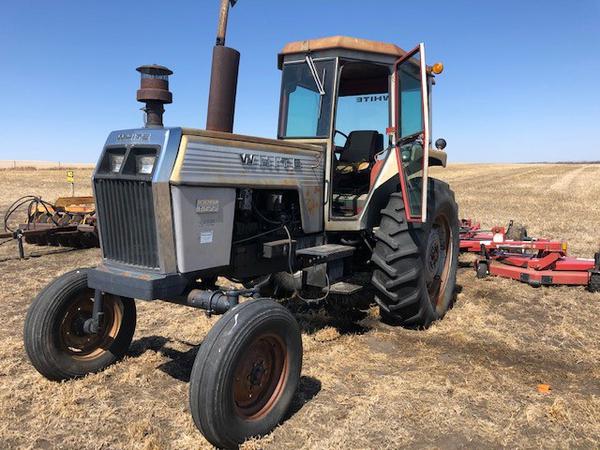Register an account with RME to store your favorite equipment and easily compare between units.
Register
—Article originally sourced from Country Guide’s Helen Lammers-Help
Taking care of yourself during those winter months
The truth is that farming is hard on your mental health. So take this advice, and protect yourself.
When Stewart Skinner returned to the family farm near Listowel, Ont., after university, he was eager to put what he had learned into practice. Despite careful planning, however, adding a second sow herd in a rented barn did not go well.
As hog prices fell and corn prices soared, the operation was losing money, and Skinner feared he would lose everything that his parents had worked so hard for.
Skinner blamed himself. He couldn’t sleep. He spiraled downward into depression. He lost hope and became suicidal.
Fortunately, when Skinner told his parents what he was going through, they responded with unconditional love and he felt some of the burden lift from his shoulders. It was “a glimmer of light at the end of a very dark tunnel,” he says, although he remained in a fragile state and it would be many months before he could return to active farming.
Today Skinner and his wife, Jessica Kelly, bravely share their story in hopes of helping others. Skinner’s situation is one that is all too common in agriculture, says Dr. Michael Rosmann, a clinical psychologist and farmer in Harlan, Iowa.
Suicide rates in the farming population are three times higher than other occupations, he says. “It is one of the most stressful and dangerous occupations.”
Many factors contribute to the high stress levels in agriculture, says Rosmann, who has seen the effects first-hand during his 20 years of counselling farmers. Farmers face unpredictable weather and markets, plus crises like disease outbreaks and barn fires. They are also heavily invested both financially and emotionally with pressure to carry on the family legacy. And the effects of high stress levels have traditionally been compounded by a mentality of “toughing it out alone” in agriculture.
Rosmann says farmers and ranchers are driven by the Agrarian Imperative, an urge to gather the land and resources needed to produce the essentials of life and to feed the world. Unfortunately, this sense of purpose comes with a dark side. “When we don’t succeed, even when it’s due to factors beyond our control,” he says, “we blame ourselves, we work harder, wear ourselves out, and become depressed and suicidal.”
Skinner was fortunate his father was able to take over his farm management responsibilities while he worked at restoring his mental health. A six-week trip to Kenya to work with impoverished farmers through the Kenyan Kids Foundation acted as a kind of reset.
Stepping away from the daily stresses of the farm also helped him to remember what made him truly happy — spending time with loved ones and enjoying the little things in life.
Skinner is back farming once again but has put several strategies in place to help him protect his mental health. As he sees it, “If I had a broken leg I would work around that, so why should this be any different?”
Knowing that sleep is very important to his well-being, Skinner protects his sleep and doesn’t schedule meetings before 10 a.m. He takes regular breaks away from the farm and maintains off-farm interests and non-farm friendships to give him a life outside of the farm.
Then he tries to separate what he can control from what he can’t, and to not derive his sense of self-worth from the farm.
Skinner has also developed a network of people he can call on when he is having a problem, including members of a swine benchmarking club which has also functioned as a kind of support group. Counselling has also been helpful, but Skinner cautions that it may take seeing more than one counsellor to find one who is a good fit.
About an hour down the road from Skinner’s farm, Joe Doré has also battled high stress levels. He and his wife Mary Ann joined her family dairy operation putting in long days as the herd was relocated from the outskirts of Toronto to New Dundee. The combination of stresses from mechanical problems in the newly constructed barn and too many sick cows took its toll on Doré. He sought medical help after experiencing volatile mood swings, and at one point was not able to get out of bed for days.
Following a diagnosis of a mood disorder, anxiety and depression, Doré saw a counsellor and took prescribed medications. “The counselling sessions helped me find ways to alleviate anxiety, to concentrate and curb mood swings,” he says. And while it took some time to get the right dosages, Doré says “medication is a tool that has worked and with regular followups continues to be a safe and effective way of maintaining a healthy mind.”
Both Skinner and Doré went public with their stories as part of the Bell “Let’s Talk Day” last January. Events like this are helping to reduce the stigma around mental illness.
While a survey of 1,100 producers across Canada in 2015-16 by University of Guelph professor Dr. Andria Jones-Bitton found that high levels of stress, burnout, depression and mental exhaustion were reported by farmers, two-thirds of farmers agreed that seeing a mental health professional can be helpful and that seeking professional help did not make them a weak person.
“The more stories we share, the more it gives others permission to talk about it,” Jones-Bitton says.
Janet Smith, manager of counselling services at Farm, Rural & Northern Manitoba Support Services in Brandon, Man., advises that it’s also very important to practice self-care if you are supporting a loved one who is struggling with mental health issues. Otherwise, she explains, you can become overwhelmed and you can experience what is called caregiver burnout.
Yet lack of availability and the cost of support services can be issues in rural areas.
Jones-Bitton is working with a cross-disciplinary team to develop resources for producers. During the current phase of her research, PhD student Briana Hagen is interviewing farmers to find out what resources they have found to be useful and what is still needed. Armed with this information, the research team plans to develop a mental health literacy training program to be available in the fall of 2018, and Hagen already says she has been heartened by how many farmers have willingly come forward to share their experiences with her for the research.
Start here
- Take care of yourself. Get enough sleep. Exercise. Eat healthy.
- Talk about it. Talk to a loved one about what you’re going through. Find someone to talk to who’s a good listener.
- Avoid using alcohol as a crutch. It usually makes the problem worse.
- Seek medical help. Medication and counselling are tools that can help.
Help from a farmer
Anxiety created by ongoing financial stress led Manitoba hog farmer Gerry Friesen to sell his farm in 2007. Friesen went on to become trained in peer support and now leads stress management workshops. He offers three-pronged advice for farmers who are dealing with stress overload.
First, he recommends trying to become more aware of what you are experiencing. Stress can manifest in mental, emotional or physical problems like stiff necks and sore backs as our bodies hold the tension. Stress can also cause us to be quick to anger or to engage in unsafe behaviours that lead to accidents and injury.
Second, he advises farmers to do an inventory of what’s causing them stress and to divide those stressors into those that can be controlled and those that can’t. “Put the ones you can’t control on the shelf,” he says. “What’s left are the stressors that you can control, which is much less overwhelming.” And while this is easier said than done, it really works, he says.
His third piece of advice is to talk about what’s bothering you. “Don’t bottle it up. Find someone who’s a good listener and who understands what you’re going through.” Friesen says when you verbalize your worries, it eases the pressures. And when you talk to others who have been there, it normalizes the experience.
Gerry Friesen.photo: Supplied
Resources
- Canadian Mental Health Association, a national charity that helps maintain and improve mental health for all Canadians.
- Manitoba Farm, Rural & Northern Support Services offers telephone and online support to farmers, as well as rural and northern Manitobans. In Manitoba call toll-free 1-866-367-3276 (in Manitoba) or 204-571-4180 (when calling from outside Manitoba) or use the online chat service (only for Manitoba residents). A lot of information is available online and a booklet called “Stress on the Farm” can be mailed out on request.
- Gerry Friesen blogs about his personal experiences in his “The Recovering Farmer” blog.
- Calm in the Storm app is a personalized stress management “Coach” that is completely private.
- University of Guelph Advancement of Wellness and Resilience in Research and Education Group (AWAR2E) Twitter @ovcawar2e
- Read Stewart Skinner’s blog post on his mental health journey for Bell “Let’s Talk Day” and Joe and Mary Ann Doré’s ‘Recognizing an Invisible Illness and Finding Help on the Farm.‘
- Canadian Agricultural Safety Association (CASA) 32-page booklet “Difficult Times: Stress on the Farm.”
Share This Article:





